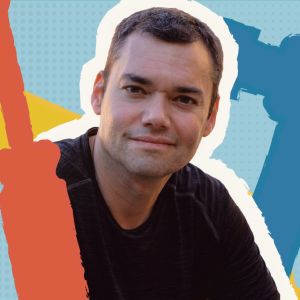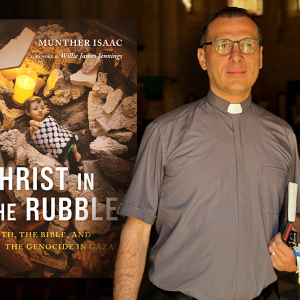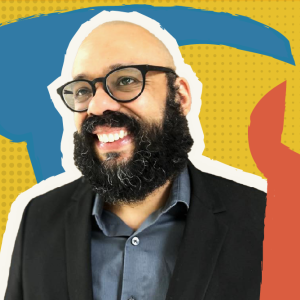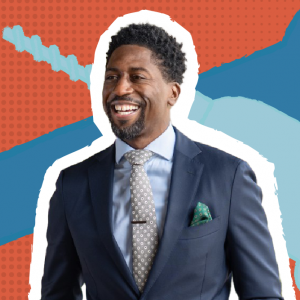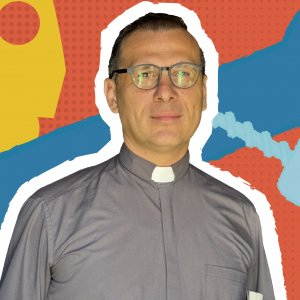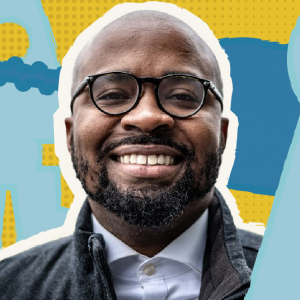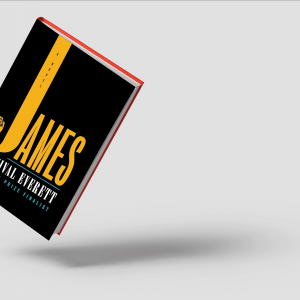
Josiah R. Daniels (he/him) joined Sojourners in 2021 and is the senior associate opinion editor at sojo.net. He is a native of the southwest suburbs of Chicago, but currently resides in the Pacific Northwest with his family.
Josiah loves being a journalist because he believes everything must be questioned and investigated. In all his coverage, he prioritizes fairness, accuracy, and journalistic integrity. Along with following Sojourners’ editorial policies and procedures, he also follows the Society of Professional Journalists’ code of ethics.
Josiah is the co-founder of The Reconstruct interview series, which focuses on interviewing people who have faith in a new future and are working toward repairing the present. He also co-leads The Sojourners Journalism Cohort.
His coverage areas are primarily identity, religion, politics, and class. He has written book and movie reviews and reported on a church that became an impromptu shelter for hundreds of refugees seeking asylum in the United States. In 2023, NPR’s Weekend Edition interviewed him about a piece he wrote criticizing an ad campaign for spending millions of dollars to rebrand Jesus via TV spots. He is especially interested in the genre of narrative journalism.
When not working, he is begrudgingly watching a Chicago Bulls game, playing basketball, or listening to John Coltrane’s A Love Supreme. He does not have or use social media.
Posts By This Author
Slouching Towards the Truth
Alissa Wilkinson, a movie critic at The New York Times and a Didion expert, is especially interested in how Hollywood continues to use such cliches when telling stories. Her newest book, We Tell Ourselves Stories: Joan Didion in the American Dream Machine, is an exploration of Didion’s writing in connection to the movie business and how her observations about Hollywood can help us interpret the current political landscape
Jesus Was a Terrorist
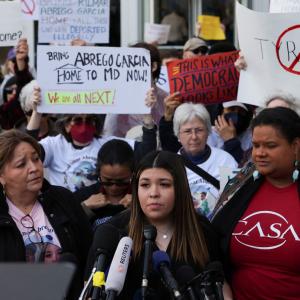
Jennifer Vasquez Sura, wife of Kilmar Abrego Garcia, speaks during a press conference on the day of a hearing in the case related to Kilmar Abrego Garcia, the Salvadoran man who was deported without due process by the U.S. President Donald Trump administration to a prison in El Salvador, outside U.S. District Court in Greenbelt, Maryland, U.S., April 15, 2025. REUTERS/Leah Millis TPX IMAGES OF THE DAY
At some point this Easter Weekend, Christians will be reflecting on the final words that Jesus spoke from the cross, sometimes referred to as the seven last words of Jesus.
When I was younger, I was convinced that System of a Down’s “Chop Suey!” was a Christian song because lead vocalist and lyricist Serj Tankian incorporated Jesus’ final declarations into the song. But dissimilar to the order that Christians have typically arranged Jesus’ final words, the song first quotes the cry of reunion and then climaxes with the cry of dereliction.
Considering that the Roman Empire believed Jesus was a terrorist and crucified him as one, emphasizing the cry of dereliction seems apt.
Has Zionism Become an Idol?
Peter Beinart, author of Being Jewish After the Destruction of Gaza, rejects the idea that the liberation of Palestine is an antimsemitic project. In fact, he argues that Zionism has become an idol for some Jewish leaders, and advocating for Palestinian people
If God Can Roll Away Stones, Why Are Palestinians Still Trapped Under the Rubble?
In ‘Christ in the Rubble,’ Palestinian pastor Rev. Munther Isaac surveys the devastation of his homeland and finds God in the most unexpected places.
Is ‘Wokeness’ Worth Saving?
The term “woke” has become something of an anathema in recent years. Those on the Right use “woke” to disparage anything they think of as social justice or political correctness. Those on the Left initially deployed the term to describe a person who was socially conscious, but after it became apparent that banks and corporations were adopting “woke” coded language, and that the semantics of “wokeism” were more performative than substantive, “woke” fell out of vogue.
How One Theologian Is Composing a Soundtrack for His Faith and Activism
Yanan Rahim Navarez Melo is a theologian getting his MDiv at Princeton Theological Serminary. He's also an artist pushing the boundaries of a burgeoning genre known as postclassical music. Here's how he sees these two areas of study overlapping.
This Oscar Romero Podcast Is the True Crime Binge You've Been Waiting For
I’d wager that whether you are new to Sojourners or a longtime subscriber, you probably have a deep admiration for the late Salvadoran archbishop and liberation theologian, St. Óscar Romero. And if you don’t, then you’re about to.
Molly McCully Brown Has Faith that Attention Will Save Us
Whatever multitasking, social media doomscroll, or email hell you’ve got yourself in right now, I want you to slow down, take a deep breath, and give your full attention to this interview.
Christian Nationalists Don’t Want Us To Remember the Real MLK
A favorite movie of mine growing up was the 1999 cartoon Our Friend, Martin. It combines two of the subjects I love most: time travel and Martin Luther King Jr. The main character, Miles, a Black sixth grader, visits the childhood home of King and ends up traveling back in time to meet King at various stages of his life. Miles, who was largely unaware of King before time traveling, eventually learns that King was assassinated. In order to prevent this, Miles convinces his new friend Martin to come to the future with him. And while that decision spares King’s life, the movie makes it clear that Miles saving his friend’s life would prevent the racial equality we now enjoy in the U.S.
In the modern U.S., are we really enjoying a post-King racial equality?
Munther Isaac Warns the Church Against Denying Genocide in Gaza
When I visited Rev. Munther Isaac in Bethlehem, the West Bank, in October, he mentioned that he was previously opposed to liberation theologian James H. Cone. Isaac was trained in theologically conservative teachings, growing up in a conservative church and then leaving Palestine to attend a conservative seminary in the U.S.
What Faith Communities Can Do to Support Migrants During Trump’s Second Term
For a long time, I’ve wondered how, on a practical level, something like mass deportations would work. Specifically, I’ve wondered how churches providing shelter to immigrants will respond if and when Immigration and Customs Enforcement agents show up to deport people seeking refuge. What can faith communities, activists, and people of conscience do to tangibly help immigrants right now?
Andrew Wilkes Is Convinced That the Gospel and Socialism Go Together
Back when X was called Twitter, and back when I had social media, I met Andrew Wilkes. I had read some of Wilkes’ writings on Black radicalism and capitalism, and immediately decided he was someone worth following. Not only was he writing on topics that occupied a major preoccupation of my own, but he was also a Black Christian. While I think it is largely a myth that leftist politics is primarily a “white space” (whatever that means), I think it’s fair to say that Black Christian leftists are a rarity. So when I discovered Wilkes, I made a commitment to follow his work.
D. Danyelle Thomas Sees Blackness as The Sacred Text of Our Time
D. Danyelle Thomas, the digital pastor of Unfit Christian and the author of The Day That God Saw Me as Black, also finds theological meaning in fiction. One of the conversation partners for her book is the literature of Toni Morrison. I love Morrison because her characters are often struggling with life’s deepest theological questions while also proudly asserting that they are Black and beautiful. Thomas articulated this idea in her own words, saying, “I don’t navigate this world without my Blackness, so I certainly won’t navigate my relationship with God without it.”
What I Hope To Witness in Israel/Palestine
As an opinion journalist who is also a Christian, I believe my primary responsibility is to provide a myriad of perspectives that challenge or — when necessary — correct readers’ opinions, all in the hope that through reading Sojourners’ opinion section they might realize that Christ is inviting them to make the world a more just place.
Patty Krawec on Why We Are Both Oppressed and Oppressor
I contain multiple identities. On the one hand, I am a Black man whose ancestors were enslaved, then pushed into ghettos, and now exploited through the unjust prison labor system. On the other hand, I am living on the stolen land of the Duwamish people. I can’t escape the colonial history of the U.S. and its reverberating effects.
There are times when I try to convince myself that, because I am a Black person living in the U.S., it’s not my responsibility to wrestle with the legacy of colonialism and how I might be a beneficiary of that history. However, after my conversation with author and activist Patty Krawec, I am convinced that I need to view myself through a more complicated lens.
Finding Christianity at the Nexus of Anarchy and Blackness
In Against Me!’s song “I Was a Teenage Anarchist,” Laura Jane Grace sings, “I was a teenage anarchist / But the politics were too convenient.” The song is a catchy tune that has stuck with me, even if I’ve outgrown the punk-rock-emo scene. But unlike Grace, I have not outgrown my anarchistic impulses.
Popularly, anarchy is associated with “chaos,” but I think of it more in terms of avant-garde jazz, where everyone is working together in their own unique way to create a sort of consensus.
So, when I recently heard of a new book focused entirely on the nexus between anarchism and Christianity, I had to investigate.
A Cathartic, Corrective Companion to ‘Huckleberry Finn’
PERCIVAL EVERETT’S NOVEL James is something of a spiritual successor and corrective companion to Mark Twain’s Adventures of Huckleberry Finn. When I learned that Everett, who is a fan of Twain’s work, was writing a novel from the perspective of Twain’s character, “N----- Jim,” I knew it’d be a must-read (note: Twain and Everett print the censored word in full). But I decided to read Adventures of Huckleberry Finn first, and while not necessary before reading James, I’m glad I did.
Everett’s novel is set during the time leading up to the Civil War. When James discovers that he’ll be sold and separated from his wife and daughter, he runs away; he eventually runs into Huckleberry Finn, who has faked his own death to escape his abusive father. James and Huck form an alliance and begin making their way down the Mississippi River. This is a perilous journey, both because of the precarity of the river and because of the thing that continues to haunt the United States: race. James is a slave, and so he is raced as Black; Huck, a pubescent prankster, is free and so he is raced as white. But these designations ultimately obscure the human connection between the two characters and their respective groups.
Black Catholic Hope in the Shadow of America
In this week’s conversation with writer and novelist Alessandra Harris, we spoke about her love of writing and when she first realized she wanted to be a writer. She was in fourth grade and the story she had written about a genie was chosen by her teacher to receive a prize. When you’re a kid, there’s just something extremely compelling about the fantasy of encountering a genie who will grant you wishes galore. Of course, as a kid, our wishes are rather innocent and self-centered: “I wish I could meet Michael Jordan,” “I wish the Chicago Bulls could win one more championship,” and, last but not least, “I wish for more wishes.” As you grow up, you realize genies aren’t real but that doesn’t prevent you from imagining what you’d wish for if you had three, two, or even a single wish. And as we age, our wishes tend to transform into a single hope for something innocent and unselfish.
What’s Wrong With DEI?
Editor’s note: A version of this article first appeared on sojo.net on Jan. 9, 2024 as “What DEI Trainings and Evangelical Retreats Have in Common.”
JONATHAN TRAN TELLS a story he encountered while researching his book Asian Americans and the Spirit of Racial Capitalism, about Chinese immigrants who lived in the Mississippi Delta during the Reconstruction period. After the Civil War, Tran says, white people not only prevented Black people from living in certain neighborhoods and attending schools with their white children — they discriminated similarly against people of Chinese descent.
But dissimilar to the Delta’s Black population, the Chinese immigrants were able to open modest grocery stores, which allowed them to accumulate wealth thanks to Black patronage. In this way, the Delta Chinese immigrants saw their material conditions improve — but this improvement came under a system of white supremacy, which necessitated the exclusion of the Delta’s Black population.
Tran tells this story to demonstrate the ways that capitalism and white supremacy have become intertwined. In a nod to the Black radical tradition, Tran refers to this system as racial capitalism. The account also demonstrates Tran’s commitment to storytelling. He doesn’t explain the negative effects of racial capitalism in a removed or abstract way; rather, he leans into the complicated histories that have pitted racially marginalized groups against one another.
Tran, an associate dean of Baylor University’s Honors College and an associate professor of theology, understands how stories are influenced by material reality — which is why, for Tran, criticism of racism that does not also include a critique of the capitalist system is wrong-headed. But Tran doesn’t just critique racial capitalism or anti-racist enterprises that avoid economics. Tran believes that Christian theology offers an alternative story to racial capitalism, one that finds its locus in the “divine economy.”
Tran talked with sojo.net associate opinion editor Josiah R. Daniels last fall about Christian theology, anti-racism, W.E.B. Du Bois, and what it means to live into a reconstructed reality. — The Editors
We Listen to Jesus — Until He Says ‘Set the Prisoner Free’
Anyone who has spent even a second in a prison knows it’s hell. Growing up in church, I noticed people who participated in the church’s prison ministry were both respected and feared. Respected because they were doing what the writer of Hebrews admonishes believers to do regarding those in chains: Remember them as though you were in prison with them (13:3). But they were feared because many of them had actually been in prison. Rather than the prison system or the criminal legal system being classified as barbaric, it was the prisoners who were typically understood to be barbarians.
Joe Ingle has spent a lot of time in prison. Ingle is a writer and death row minister who has been active in prison ministry since the ’70s. A native of North Carolina and a graduate of Union Theological Seminary, Ingle has dedicated his life to being present with and advocating for the 1.9 million people incarcerated in the U.S., especially the more than 2,300 incarcerated people on death row.

